on
Webinar Notes // ICCT Book Presentation: Preparedness and Consequence Management - Part V of the Handbook of Terrorism Prevention & Preparedness
You can find the whole handbook here. Open access, completely free.
Speakers
Chapter 31: Prevention of Public Panic in the Wake of Terrorist Incidents
- Juan Merizalde: a researcher and doctoral student in the School of Criminology and Justice Studies, University of Massachusetts Lowell. His research interests include asymmetric warfare, the private defense sector, counter-terrorism policy, and community resilience. Previously, Juan served in the US Air Force and was deployed to Operation Enduring Freedom and Operation Iraqi Freedom.
- John D. Colautti: a researcher and doctoral student in the School of Criminology and Justice Studies, University of Massachusetts Lowell. He is also Adjunct Professor at Fitchburg State University, an instructor with Crisis Systems Management, LLC, and an instructor with the Massachusetts Municipal Police Training Committee. He has over 30 years of probation, law enforcement and private security experience.
- James J. F. Forest: is a Professor in the School of Criminology and Justice Studies, University of Massachusetts Lowell. He is also a Visiting Professor at the Fletcher School of Law and Diplomacy, Tufts University. He has published 20 books and dozens of scholarly research articles and reports on international security, counterterrorism and U.S. homeland security, and is coeditor of the peer-reviewed scholarly journal ‘Perspectives on Terrorism’.
- Richard J. Chasdi: Professorial Lecturer, Department of Political Science, The George Washington University. He is also an Adjunct Senior Fellow, International Center for Political Violence and Terrorism Research (ICPVTR) at the S. Rajaratnam School of International Studies (RSIS) at Nanyang Technological University, Singapore. Prior to that, Dr. Chasdi was a Professor of Management at Walsh College, Troy, Michigan. He received his B.A. in Politics from Brandeis University in 1981, his M.A. in Political Science from Boston College in 1985, and his Ph.D. in Political Science from Purdue University in 1995. He has published four books on terrorism and counterterrorism, and several book chapters and refereed academic articles. Chasdi’s first monograph, Serenade of Suffering: A Portrait of Middle East Terrorism, 1968-1993 (Lexington Books, 1999) received Choice magazine’s “Outstanding Academic Title” distinction in the field of International Relations in 2000. Dr. Chasdi serves on the Editorial Board of Perspectives on Terrorism (a journal of the Terrorism Research Initiative), and on the Editorial Board of Armed Forces & Society. In 2017, Chasdi was a Fulbright Specialist at RSIS at Nanyang Technological University, working as a Visiting Fellow at the International Centre for Political Violence and Terrorism Research (ICPVTR). He has served as a news consultant for National Public Radio (NPR), Al-Jazeera, China Global Television Network (CGTN), and Radio Sputnik.
- Marie Robin: is a PhD candidate affiliated with the Center for War Studies at the University of Southern Denmark, and the Centre Thucydide at Université Paris 2 Panthéon-Assas. Her dissertation proposes a conceptualization of the role of Revenge in International Relations by analyzing the revenge narratives of the Islamic State, Al Qaeda, and Boko Haram. For her dissertation, Marie received funding from DGRIS/IRSEM. She presented her research at ISA Toronto, EISS Paris, as well as various national conferences. Marie taught courses of Ethics and of International Relations at Sciences Po, at the Université de Lille, and at the University of Southern Denmark. She also organized the first edition of the Graduate Conference of the War Studies Network in January 2020. In addition to her PhD, she works as a research assistant and translators for various academic publications and centers.
- Tom Parker: is the author of “Avoiding the Terrorist Trap: Why Respecting Human Rights is the Key to Defeating Terrorism” (2019). He was most recently the Chief of Party of a European Union project providing assistance to the Office of the National Security Adviser in Baghdad, Iraq. Tom has previously served as an adviser on human rights and counter-terrorism to United Nations Counter-Terrorism Implementation Task Force (CTITF) and was one of the principal authors of the UN’s Preventing Violent Extremism Plan of Action. He has also worked as the Policy Director for Terrorism, Counterterrorism and Human Rights for Amnesty International USA, as a war crimes investigator for the United Nations International Criminal 217 Fromkin, David, supra note 5, p. 697 218 Fromkin, David, supra note 5, p. 697 219 Prime Minister Jens Stoltenberg, National Memorial Address, Oslo Cathedral, 24 July 2011 220 Sen. McCain’s full statement on the CIA torture report, USA Today, 9 December 2014. Available at: https://www.usatoday.com/story/news/politics/2014/12/09/john-mccain-statement-cia-terror-report/20144015/ 1124 PARKER DOI: 10.19165/2020.6.0134 Tribunal for the former Yugoslavia (ICTY) working in the field in Bosnia and Kosovo, and as an Intelligence Officer in the British Security Service (MI5). Tom has taught undergraduate and postgraduate courses on international terrorism in Yale University’s Residential College Seminar Program, Bard College’s Globalization and International Affairs Program, and the National Defense University at Fort Bragg.
Chapter 35: Terrorism Prevention – The UN Plan of Action (2015) and Beyond
- Alex P. Schmid: the Editor of this Handbook of Terrorism Prevention and Preparedness, is a Research Fellow at the International Centre for Counter-Terrorism (ICCT) in The Hague. He is Editor-in-Chief of ‘Perspectives on Terrorism’ and former Co-Editor of ‘Terrorism and Political Violence’ – two of the leading journals in the field of Terrorism Studies. Until 2009, Prof. Schmid held a chair in International Relations at the University of St. Andrews where he was also Director of the Centre for the Study of Terrorism and Political Violence (CSTPV). Previous positions include Officer-in-Charge of the Terrorism Prevention Branch of the UN Office on Drugs and Crime in Vienna (1999-2005) and a chair in Conflict Resolution at Erasmus University, Rotterdam (1991-1999). Between 1978 and 2018 professor Schmid also held various positions at Leiden University and at its The Hague Campus. He is Director of the Vienna-based Terrorism Research Initiative (TRI), a consortium of institutes and individual scholars seeking to enhance human security through collaborative research. Prof. em. Schmid has more than 200 publications and reports to his name, including the awardwinning volume ‘Political Terrorism’ (1984, 1988, and 2006) and the ‘Routledge Handbook of Terrorism Research’ (2011, 2013).
Notes
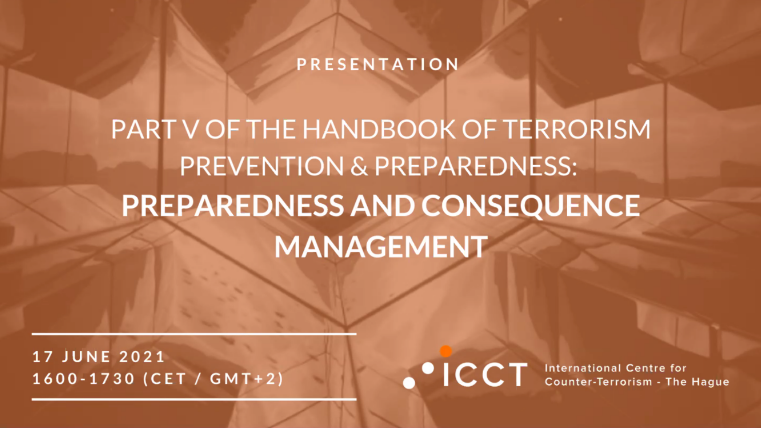
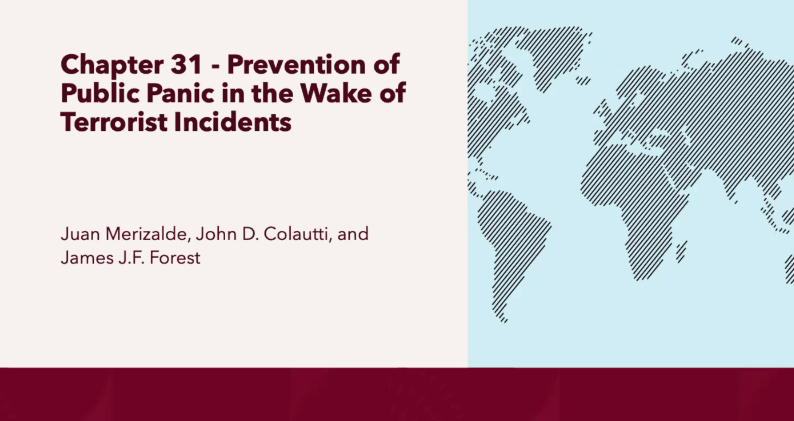
- Panic reduction/mitigation strategies:
- Rapid restoration of normalcy
- Reducing uncertainty and
- Building government trust
- Three themes of particular relevance appear most prominent in the research on decreasing uncertainty and increasing community resilience:
- Preparation: Development of numerous national-level disaster preparedness plans, several of which focus prominently on fostering resilience for community members and critical infrastructure.
- Communication: Overall, the research literature highlights three areas of recommendations for government leaders that are fairly applicable in any community setting worldwide:
1 Communicate effectively, provide accurate, truthful information before, during and after an incident.
- Focus on influencing perceptions of competence, trust and good faith - before, during and after an incident - which can do a lot to reduce fear and panic; and
-
- Set an example in what you communicate and how you communicate, because if you remain calm, others will follow your lead accordingly.
- Empowerment: Having a structure in place for community volunteers to get involved in response efforts is an essential form of empowerment. Further, beyond empowering individual members of the public to be proactive in the face of terrorist threats, these types of efforts help create social bonding among community members, which also reduces panic in the wake of terrorist attacks. In fact, research has found evidence that the existence of such bonds among social groups may play a greater role in determining whether panic ensues than the response of the authorities themselves during an emergency.
- While community resilience may be difficult to define, it is even more challenging to measure or to identify and implement effective strategies for improving it.
- Ideas of self-efficacy are based upon the transfer of accountability to communities by building stronger societal pillars that can withstand shocks from man-made events such as terrorist incidents as well as natural disasters.
- Closing remarks: Policies and strategies based on solid research can benefit governments and communities worldwide. Unfortunately, there are widespread beliefs and assumptions about panic in the wake of a terrorist attack that are largely based on myth rather than fact. And when the media (and some politicians) encourage myth-making by envisioning a mass of panicked and passive victims in the wake of a terrorist attack, this leads to policies that are at best unhelpful, and potentially even counterproductive. But rather than encouraging fear (and even trying to capitalize on that fear for the sake of political agendas and profits), we must acknowledge the many things that individuals, families and communities can do - with and without their government’s involvement - to strengthen community resilience. Commitments and investments in these areas are bound to yield more sophisticated and successful measures to prevent public panic in the wake of a terrorist incident.
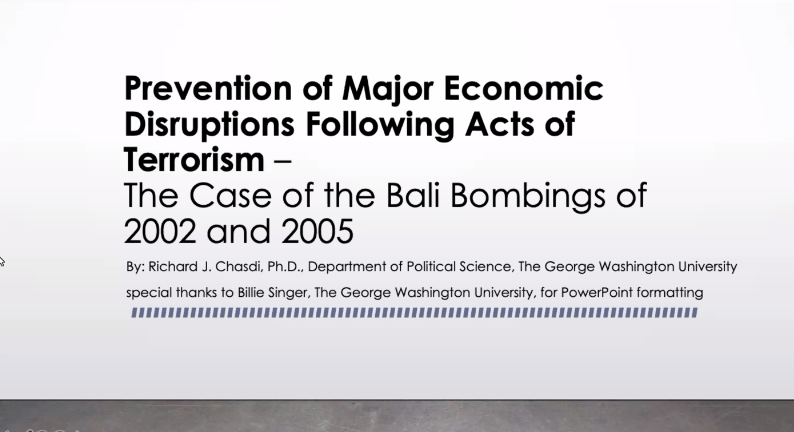
- Economic costs:
- Bali 1 (2002): U.S. $1,800 million - $2,000 million (1,8 billion - 2 billion) in lost. Resulted in a decrease of hotel occupancy by 44.6%.
- Bali 2 (2005): Primarily worked to compound economic effects of Bali 1 and cause further psychological damage; 10% decrease in hotel occupancy.
- Bali 1 (2002)
- Jema’ah Islamiya (JI) is a splinter group of Darul Islam (DI).
- Crafted by Abdullah Sungkar in 1992.
- After Abdullah’s death Abu Bakyr Ba’aysir became the predominant figure.
- International systems factors and nation-state level factor provide “political space” for JI to grow.
- Also nurture ties to al-Qaeda in Afghanistan and Pakistan.
- International systems factors:
- Asian economic crisis
- SARS virus outbreak
- Global war on terrorism/War in Afghanistan
- Nation-state factors:
- The fragility of the Suharto regime
- Economic crises for most marginalized Indonesians
- Separatist movements and conflict between religious groups.
- Bali 2 (2005)
- Al-Qaeda in the Malay Archipelago (Tanzim Qaedat al-Jihad); a Jema’ah Islamiya “splinter group”.
- The “Terrorist Group-Life Cycle” (Lasswell): cascade of international and “nation-state” factor effects.
- Economic diversification: The need for countries highly dependent on tourism to diversify the economy to promote economic and societal resilience.
- Civil society is intrinsic to combat terrorism in effective and sustained ways
- Multilateralism: The need for anticipatory government sponsored insurance programs in Indonesia, with public-private-partnership emphasis; perhaps a formation of a worldwide counterterrorism insurance program.
- Importance of effective political institutionalization: where bureaucracies, including the army and political parties, reflect broad segments of society.
- Importance of effective counterterrorism legislation:
- Negative sanctions with “teeth”
- Effective organization of security forces to facilitate more seamless coordination
- Deradicalization and rehabilitation programs
- Public-private partnership initiatives and opportunities
- Use of “positive sanctions” for terrorist constituent groups
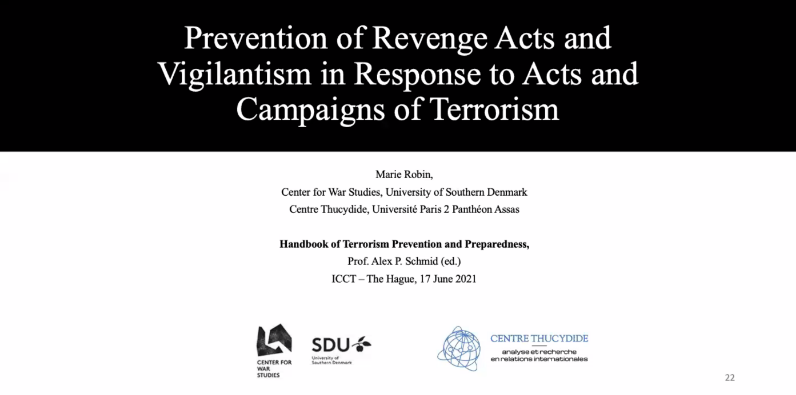
- Marie Robin started by talking about a hearth touching event- Paris Bataclan concert attack which resulted in 89 deaths, including Helene Muyal-Leiris, a wife and a mother of a 17-month old. Her husband posted a message on Facebook and wrote a beautiful sentence: “Vous n’aurez pas ma vengeance”, “You won’t have my vengeance”.
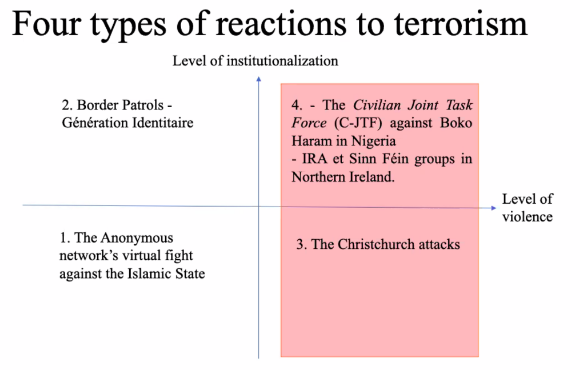
- Measures and recommendations:
- Fight the need:
- By presenting an accurate evaluation of the actual threat
- By offering transparency about the actions taken by the state and its security forces
- By rebuilding trust between State and society
- By encouraging recruitment to the military and the police from every segment of society
- Fight the divisions:
- By establishing a clear distinction between terrorists and ordinary citizens
- By promoting inter-community dialogue
- By promoting neutral, inter-community media
- By countering statements that seek to recall again and again past terrorist attacks. p.s. Statements with the goal of stigmatizing and marginalizing entire communities.
- Fight the means:
- By reviewing legislation on the private possession and use of arms
- By ensuring accountability and judicial sanctions against those who act as vigilantes and avengers.
- Fight the need:
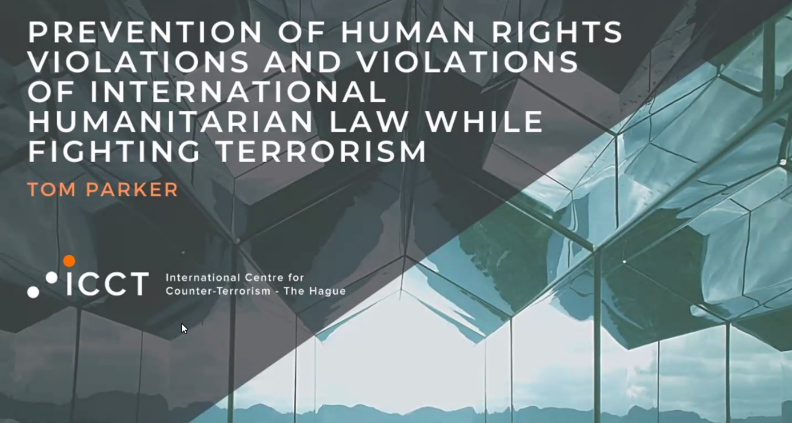
- Terrorism is a contingent political strategy.
- Provoking governments to overreact to the threat they pose by
- introducing draconian security measures,
- curtailing civil liberties,
- and infringing established human rights protections.
- This results in:
- Greater societal polarization
- The radicalization of greater numbers of the terrorists’ potential constituents
- The undermining of the state’s legitimacy both at home and abroad.
- Political jiu-jitsu
- Core themes of terrorist doctrine:
- Provoking an overreaction
- Contesting legitimacy
- International human rights law actually accords States considerable latitude in responding to terrorist threats.
- Social science research has identified state abuses as a major - perhaps the major - driver of terrorist recruitment.
- Most states focus on the resilience of critical systems and of public morale, but not on the resiliency of national laws and values.
- Tom Parker also talked briefly about his new book, Avoiding the Terrorist Tap. He also shared two discount codes but I am not comfortable sharing as I don’t know what he wants. The webinar was also streamed on Youtube so I guess you can head there.
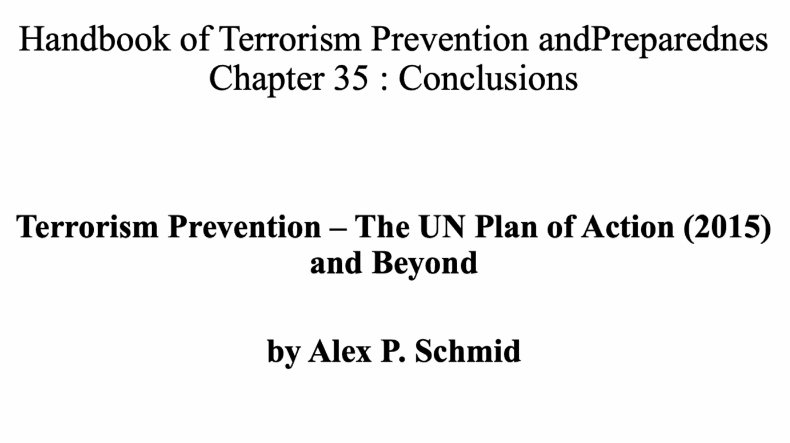
- Substantive Priority Areas of the UN Plan of Action to Prevent Violent Extremism:
- Dialogue and conflict prevention
- Strengthening good governance, human rights and the rule of law
- Engaging communities
- Empowering youth
- Gender equality and empowering women
- Education, skill development and employment facilitation
- Strategic communications, the internet and the social media
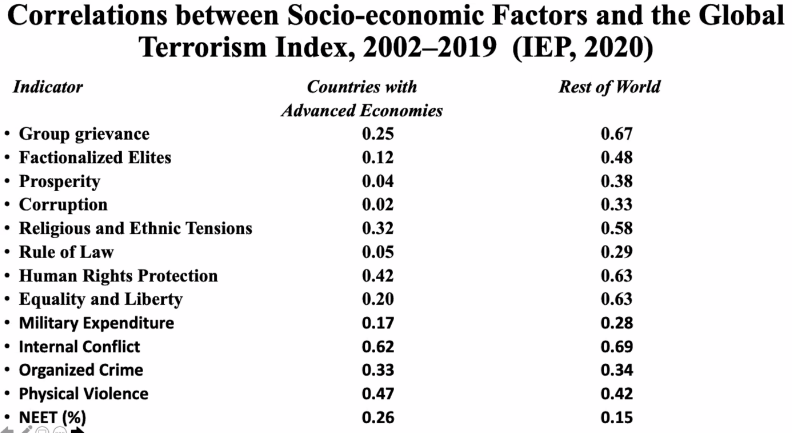
- NEET is an acronym for Not in Education, Employment, or Training
- Institute for Economics & Peace Findings:
- High levels of group grievance and a weak rule of law is correlated with terrorism across all countries.
- In the more economically developed countries, social disenfranchisement and exclusion play an important role in terrorism.
- In less economically developed countries, religious or ethnic ruptures, and corruption are more strongly associated with high levels of terrorism.
- One important cause of non-state terrorism is a desire to exact revenge for some perceived or real injustice that has not been adequately addressed by the existing political system.
- Many terrorists want to produce an over-reaction with their atrocities, expecting that government will target and repress the terrorists’ professed constituency as a whole, which is likely to drive new recruits into the arms of the terrorist organization.
- Limit the possibilities for terrorists to obtaining free publicity with their public outrages.
- Preventing polarization in society, protecting minorities against hate crimes while engaging in strengthening social cohesion and resilience and engaging in conflict resolution goes a long way in preventing terrorism at home.